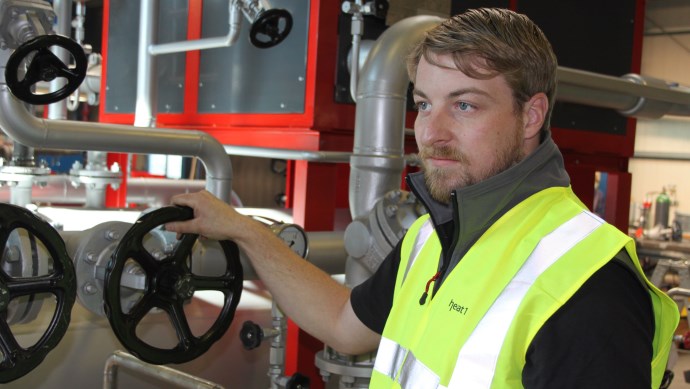Karsten Loedige is an “old hand” in the business of thermal oil plants. Since the beginning of 2011, Karsten Loedige is the “first man for all cases”when the customer service is asked in assembly, commisioning or plant operation. With our heatnews editor he talks about his work and gives advices for a safe and sustainable plant operation.
heatnews: Mr. Loedige, you come around a lot and take care of many thermal oil plants. What are the three most important things from your point of view that should be considered for the operation of a plant?
Loedige: Thermal oil plants are actually uncomplicated in the operation- when some basic rules are considered. It includes the measurement and recording of the pump pressure and the flow in the plant at least once a month in order to detect problems – for example impurities – at an early stage. Secondly, a comprehensive oil analysis should absolutely take place once a year. This is the only way to determine dangerous lowering of the flash point by low boilers in the plant that could lead to a lapse of the operating license.Furthermore low boilers jeopardise almost all plant parts, lead to plant failures and therefore high consequential costs. Finally I strongly recommend to build up stocks of essential wear and tear parts such as e.g. pumps and parts of the safety chain in order to react quickly in case of failures and to keep the downtime as low as possible.
Which project was your most exciting one?
The commissioning of the three 15 MW heaters for the solar thermal power plant “Extresol 3” last year in Spain is surely one of them. We had to meet a tight schedule and had to ensure with our heaters that the entire plant became “winter-hardy”. After all the heat transfer medium diphyl used in this power plant freezes already at around 12 degrees Celsius and in the Spanish high plateau the temperatures in winter do fall far beneath. The plant was already filled completely. About 2,5 mio. liters of heat transfer oil had to be protected from freezing. If there would have been any problems during the commissioning of the heaters, you would have to thaw the heat transfer oil again on an area of approximately 2,5 square kilometers.
Sounds like a considerably responsibility …
That is right. However the cooperation of a good team and the experience from various industrial, chemcial and power plant projects help a lot. It is nevertheless always impressing to install converted up to 20.000 PS of capacity in the smallest space. Enough to heat a huge amount of thermal oil from 300° up to 400° Celcius quickly or to supply a small town with energy.
What do you like about your job?
The change! No two plants are the same and even the customer sectors are also different: The food industry requires other conditions than e.g. the chemical industry, the wood processing or the field of power plants. No-one will ever be bored there – quite the contrary! In addition, there are the different places of installation and the different mentalities you need to adjust to.
Are there any areas where you prefer to go to?
Well, it is much too sweeping a statement. Each place of installation has its own distinctive charactere. Since I myself like the Bavarian cuisine very much, I enjoy going to Bavaria!
Do you have finally any advice about the best way how to proceed in case of a plant failure?
Generally, a precise error description is always very helpful. What is very worthwhile is to write down all states of the pressure gauge and to read the fault indication on the control system as well as to have the information of the name plate available. This ever so often saves a second call.
We thank you very much for the interview!





Comments are closed.